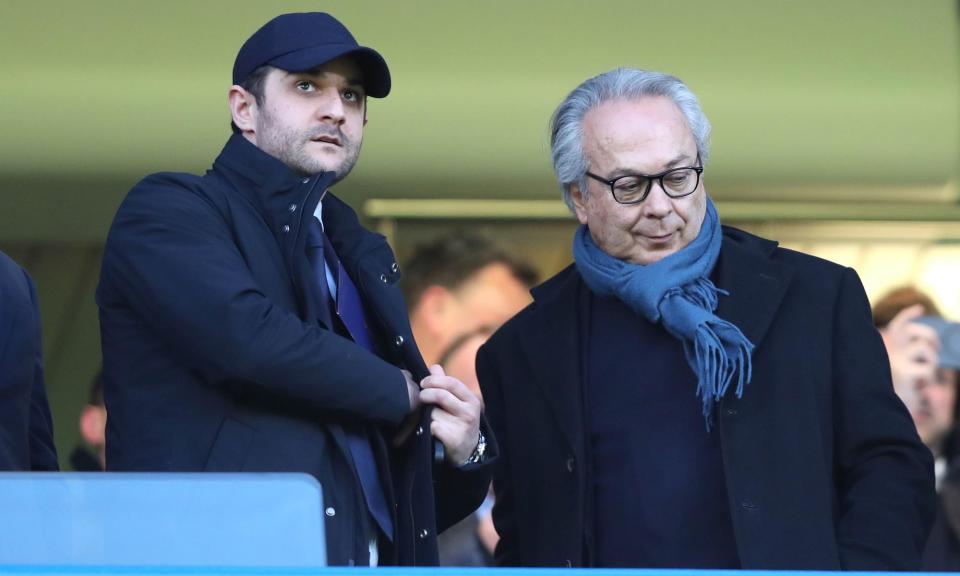Everton on the brink: questions over club’s finances are more urgent than ever

Everton fans are used to owner Farhad Moshiri telling them that better times will be arriving soon. He began his reign at the club in 2016 promising to give fans “whatever I have” – the type of soundbite he would continue to deliver during the following eight years. He promised fresh financing for the new stadium at Bramley-Moore Dock, a new star striker, and to bring in a wealthy and expert investor.
In January 2023, Moshiri told Everton’s Fan Advisory Board: “The club is not for sale, but I have been talking to top investors of real quality to bridge a gap on the stadium. I can do it [fund it] myself … We are close to having a deal done.”
Roll forward to the current day and Moshiri is not funding Everton or its new stadium development, nor has his subsequent choice of buyer – the US investment firm 777 Partners – managed to complete its takeover, even after seven months of trying.
Despite the owner assuring supporters last month that 777 was in the “home straight”, it emerged on Tuesday that fans would now have to wait even longer. The US company did not comment on why it was taking it so long to find the money, but the delays raise questions about its funding lines as Everton seems to be approaching financial and footballing cliff edges.
The club’s auditors have already said there is “material uncertainty” over Everton’s future financing “that may cast significant doubt about the group’s ability to continue as a going concern”. The possibility of Everton entering administration has even been suggested – meaning the team would endure yet another Premier League points deduction on top of those already incurred for reporting heavy financial losses.
And while the fans wait, the club’s day-to-day operations have been funded by more and more debt.
This reflects a marked change from how the club and its owner viewed its finances just 18 months ago, when Moshiri’s aides would confidently send out tables of all the Premier League teams’ debts. In them, Everton’s then net debt of £58.2m in the 2020-21 financial year meant 12 rival clubs had higher levels of borrowing.
That comparison looks less flattering now, however. Everton’s 2023 annual report states that net debt stood at £330.6m, leaving the club lagging only Spurs, Manchester United and Brighton by that measure to June 2023, according to analysis of accounts by the football finance expert Kieran Maguire. Meanwhile, total debts have grown since and the club is now thought to owe almost £550m to third-party creditors.
The largest lender to Everton is Rights and Media Funding (RMF), a Cheshire-based company with zero employees that borrows its funds from opaque offshore companies in order to lend to football clubs. Everton owes RMF about £225m and is understood to be paying interest rates of 10.25%, meaning hundreds of thousands of pounds are flowing out of the club each week.
RMF has secured its loan by having rights to property around Goodison Park. It also has clauses in its agreement that are understood to have allowed it to veto a proposed takeover by the US sports investment group MSP Capital last year. Neither RMF nor MSP commented.
MSP itself – along with its partners, the Evertonian businessmen Andy Bell and George Downing – is another large creditor. That consortium has loaned the club about £160m, which is secured over the new stadium development at Bramley-Moore Dock, as well as a charge over more than half of Moshiri’s 94% stake in the club, according to corporate documents filed in the Isle of Man.
Finances are so tight at Goodison Park that MSP could have taken control of Moshiri’s shares – and therefore the club – on Monday, as 777 had failed to repay MSP on time as part of its takeover. That deadline has now been extended, however.
There is also a small amount of debt – about £11m – owed to Metro Bank, the rump of a government-backed loan dating back to the Covid pandemic.
And, finally, while it has been trying to complete its takeover of the club, 777 has itself loaned about £160m, just to keep Everton going. It is expected to have to lend more this month.
On top of all of that, Everton has to pay its bills – including players’ wages and upfront charges to the construction firm building its new stadium, Laing O’Rourke, after years of the club unsuccessfully trying to source long-term financing options to pay for the project. Everton is understood to be paying Laing O’Rourke in advance for its work, but it would not comment on when the next bill was due. Laing said the project was on schedule.
Still, fan groups fear that the turmoil cannot continue for much longer, and suspect that the time taken to attract a new investor has made it harder to find a sustainable long-term solution.
“The idea that Everton are investible as a ‘going concern’ is becoming increasingly absurd,” wrote the Everton blogger The Esk last month.
Neither Everton nor Moshiri responded to the Guardian’s request for comment.
Eighteen months ago – when attracting a well-funded suitor might have been easier – Moshiri and his aides were more forthcoming and treated scrutiny of the club’s finances with something approaching condescension.
“With respect, there is a great difference between publication of an article with a legitimate public interest objective and an article which would merely be of interest to the public,” a spokesperson told the Guardian in the autumn of 2022 in response to a series of detailed questions about the club’s finances. “Given your focus appears to be cemented on the financial operation of a private limited company, we continue to fail to see how a legitimate public interest arises.”
It is, perhaps, simpler to see now.

